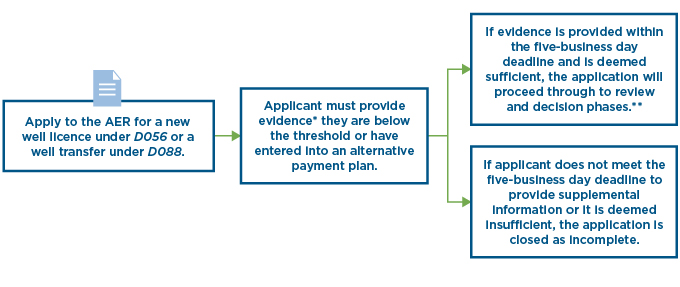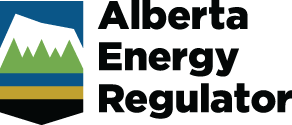Energy companies must apply for our approval to begin an energy development project or activity in Alberta. Every year, we receive about 40 000 applications, including everything from requests to access a parcel of land, to requests to drill a well, to requests to build a pipeline. Regardless of the request, we share applications with Albertans and encourage public participation in our decision making.
We are moving towards a single-system, one-stop approach for processing applications, which will change the way companies submit applications to us. Visit our Integrated Decision Approach page to learn more.
Improving Our Application Processes and Timelines
Energy developments are complex, and the process a company must follow will vary based on the type of project or activity it is proposing.
We continually evaluate and update processing times as we improve efficiency in our application review processes. This is done without affecting public involvement or the protection of public safety and the environment.
The following graph shows how we’re performing against our targets. For details on each application type, see the full applications timelines report. [Tableau]
Each application is reviewed to ensure our technical experts have the information they need to make a decision on the application within our estimated timelines.
We make every effort to process applications within our estimated times—and in most cases we do. However, in some cases it might take longer to review an application because the development is complex or because of factors beyond our control, such as incomplete applications or stakeholder or indigenous consultation requirements that have not been met.
Learn more by selecting one of our application processes.
Alternative FEMP Overview
Alt-FEMP Application
Alt-FEMP Submission Checklist
Alt-FEMP Performance Reporting
Alternative Storage
Amend/Rescind a Gas Allowable Order
Approval Transfers
Class I Fluid Disposal
Class II Fluid Disposal
Class III Fluid Disposal
CO2 EOR storage
CO2 Sequestration
Commingling
Common Carrier
Common Processor
Common Purchaser
Compulsory Pooling
Concurrent Production (CCP)
Enhanced Recovery
Good Production Practice
Gas-Oil Ratio (GOR) Penalty Relief
Lahee and Confidentiality Status Change
Long-Term Gas Removal Permits
Modifications to Existing Oilfield Waste Management Facilities
New Oilfield Waste Management Facilities
New Well Base Maximum Rate Limitation (Form O-38)
Off-Target Penalties
Pilot Project Approval
Pool Delineation and Ultimate Reserves
Rateable Take
Release-Rate Presubmission
Requesting a Delay for the Start of a New Oil Well Production Period (NOWPP)
Short-Term Gas Injection
Short-Term Gas Removal Permits
Special MRL
Special Well Spacing
Temporary Injection
Coal Exploration Program
Environmental Impact Assessment Reports
Environmental Protection Enhancement Act and Water Act Application Projects
Formal Disposition Renewal and Amendment/Renewal
Geophysical (Seismic) Exploration Programs
Oil Sands Exploration
Right-of-Entry Order Replacements on Public Lands Process
Sublease Consent
Temporary Field Authorizations
Water Act Temporary Diversion Licence
Alternative Fugitive Emissions Management Program
Alternative Storage
Amend/Rescind a Gas Allowable Order
Approval Transfers
Class I Fluid Disposal
Class II Fluid Disposal
Class III Fluid Disposal
Coal Exploration Program
Coal Mining Authorizations
Commingling
Common Carrier
Common Processor
Common Purchaser
Compulsory Pooling
Concurrent Production (CCP)
Directive 060 Nonroutine Flaring and Excess Volume
Enhanced Recovery
Environmental Impact Assessment Reports
Environmental Protection Enhancement Act and Water Act Application Projects
Formal Disposition Renewal and Amendment/Renewal
Good Production Practice
Gas-Oil Ratio (GOR) Penalty Relief
In Situ Oil Sands Authorizations
Lahee and Confidentiality Status Change
Long-Term Gas Removal Permits
Measurement Accounting and Reporting Plan (MARP) Authorizations
Modifications to Existing Oilfield Waste Management Facilities
New Oilfield Waste Management Facilities
New Well Base Maximum Rate Limitation (Form O-38)
Nonroutine Technical Authorizations
Off-Target Penalties
Oil Sands Exploration
Oil Sands Mining Authorizations
Operational Authorizations - Pipelines
Operational Authorizations - Production Operations
Partial Upgrader - In Situ
Partial Upgrader - Mining
Pilot Project Approval
Pool Delineation and Ultimate Reserves
Primary Recovery Schemes
Public Involvement Authorizations
Rateable Take
Release-Rate Presubmission
Requesting a Delay for the Start of a New Oil Well Production Period (NOWPP)
Right-of-Entry Order Replacements on Public Lands Process
Routine Authorizations
Short-Term Gas Injection
Short-Term Gas Removal Permits
Special MRL
Special Well Spacing
Sublease Consent
Temporary Field Authorizations
Temporary Injection
Water Act Temporary Diversion Licence
Listening to Concerns
If someone believes that they will be directly or adversely affected by a proposed project, they have a right to be heard by the AER. We share project applications on our Public Notice of Application page for 30 days (unless otherwise specified), which helps anyone who is concerned about a project find and understand the development plans.
We encourage anyone with concerns to submit a statement of concern for us to consider during our review of the application. If the statement of concern is relevant, complete, and submitted on time, we will consider the concerns while we decide to approve or reject the company’s application.
If we’ve already made a decision on an application, and someone believes that they may be directly and adversely affected by this decision, they may be qualified to request an appeal of our decision. Learn more about our regulatory appeal process.
Application Legislation
Provincial legislation, including the Mines and Minerals Act, Public Lands Act, Environmental Protection and Enhancement Act, and Water Act, shapes our requirements and approval processes. Learn more about these acts and what we regulate under them.
Unpaid Municipal Taxes

* As per Bulletin 2023-22 evidence includes a letter signed by the Chief Administrative Officer of the municipality on the municipality’s letterhead or a valid tax certificate. For well transfer applications where transferor exceeds the threshold, evidence includes a letter signed by a director or an officer of the company containing a verbatim citation of the condition within the purchase and sale agreement showing payment of municipal taxes owed as a condition of the purchase and sale agreement with the transferee.
** Each application submitted will follow normal application process and timelines (which may include additional SIRs and conditions where applicable).
The Statement of Concern (SOC) Process Q&As
Q1: Should I file a statement of concern (SOC) if I know an applicant does not meet the requirements outlined in Bulletin 2023-22?
Any stakeholder that has specific concerns regarding a company’s proposed energy development may submit an SOC. For an SOC to be considered, it must relate to an active application currently before the AER. Since all new well licence and well licence transfer applications will be assessed in accordance with Ministerial Order 043/ 2023 and Bulletin 2023-22, applications that fail to meet the set criteria will be closed and no longer considered active. This will result in the subsequent closure of any
associated SOCs to that application.
Q2: What happens if I have concerns regarding an applicant whose municipal tax arrears are below the threshold?
If you have specific concerns about a company’s unpaid taxes, regardless of the threshold, you may submit a statement of concern (SOC). If your SOC is relevant, complete and submitted on time, the AER will take the concerns into consideration when reviewing the company's application. An SOC should clearly and concisely describe how you would be directly and adversely affected by the approval of the proposed activity, the nature of your objection, and the outcome you seek.
For more information about the SOC process, visit our SOC page.


